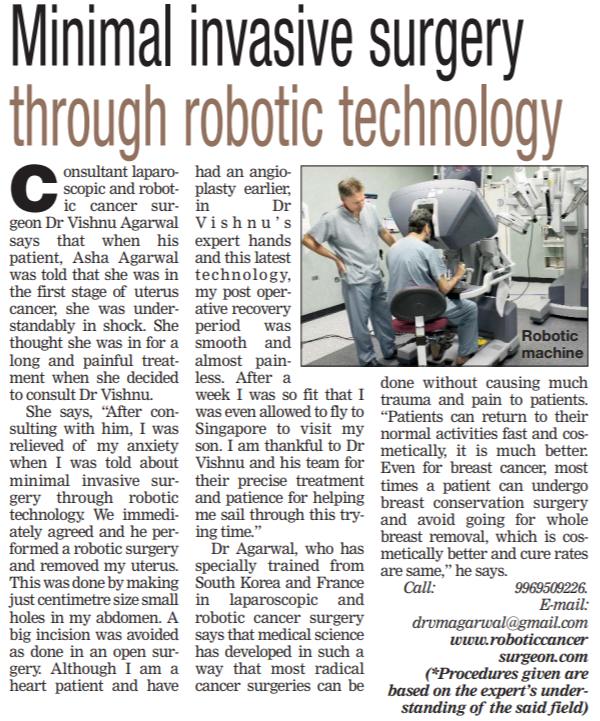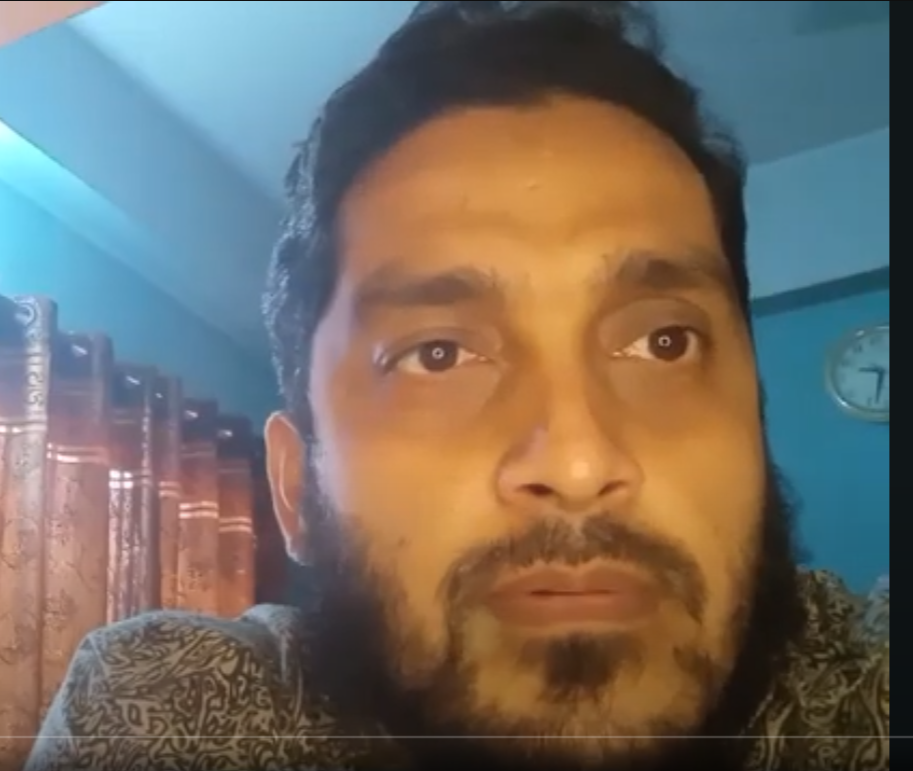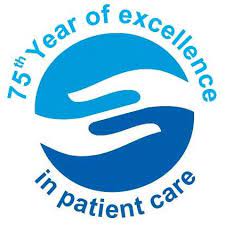Colon & Rectal Cancer occurs in Colon (Colon Cancer ) or Rectum (Rectal Cancer), depending upon where they start. They are often named together because they have many features in common.
Colon & Rectum organs are present in the lower portion of the digestive system also known as a large part of the intestine or large bowel. It is also called as LargeBowel Cancer.
It affects men as well as women and mostly found in people 50 years or older.
Colon & Rectal Cancer is the third most common type of cancer in developed countries. It is leading second in causes of cancer death in women and third for men.
Early diagnosis & treatment is key to win battle against Colon & Rectal Cancer.
Dr. Vishnu Agarwal is a Trusted Colon & Rectal Cancer Surgeon in Mumbai, India. He is known for relieving patient’s and their family from the anxiety and keeping patient’s interest at center throughout the treatment.

Snapshot of news article that appeared in The Times of India written by Dr. Vishnu Agarwal.
What Can Cause Colon & Rectal Cancer?
Family History (Colorectal Cancer)
History of Colon Polyps
Genetic Syndromes (Familial Adenomatous Polyposis (FAP))
Inflammatory Intestinal Conditions
African-American Descent
Older Age
Low Fiber
High Fat Diet
Diabetes
Overweight
Smoking
Excessive Alcohol Consumption
Radiation Therapy for cancer
Sedentary Lifestyle
Symptoms of Colon & Rectal Cancer
In the early stage of Colorectal Cancer may not have any symptoms. It may arise usually after it’s spread.
Symptoms of Colon & Rectal Cancer as follows –
Specific Symptoms
- Changes in Bowel Habits
- Feeling that the Bowel doesn't empty completely
- Fatigue or Tiredness
- Loss of Appetite
- Weight Loss
- Diarrhea or Constipation
- Bright red blood coming from the Rectum
- Dark Patches of blood in or on your Stool
- Pain and Bloating in the Abdomen
- Pelvic pain
- A Lump in the Abdomen
- Iron deficiency in Men, or in women after Menopause
- Anemia (bleeding in your intestines)
Diagnosis of Colon & Rectal Cancer
A thorough physical examination is the first step in the diagnosis. The doctor may use many tests to find whether cancer has spread to other parts of the body called metastasis.
Depending upon the symptoms and assessment doctor may recommend one or more following tests below to find the cause –
- Blood Tests (Complete blood count CBC)
- Ultrasound (Sonography)
- X-Ray (Large Intestine)
- Positron Emission Tomography or Computed Tomography (PET-CT scan)
- Magnetic Resonance Imaging (MRI)
- Colonoscopy
- Biopsy
- Proctoscopy
- Genetic Tests
- Molecular Testing of the tumor
Types of Colon & Rectal Cancer
Colorectal Adenocarcinoma
Carcinoid Tumors
Gastrointestinal Stromal Tumors
Lymphoma
Sarcomas
Melanomas
Colon & Rectal Cancer Stages
After the diagnosis of Colon & Rectal Cancer, the doctor will figure out tumor size, location, and how far it has spread. This process is called Staging.
Staging helps the doctor to predict which kind of treatment is best and what is the chance of recovery.
Staging system of Colon and Rectal Cancer based on the TNM (Tumor, Node, and Metastasis) system as follows –
Stage 0: Cancer cells are found in the mucosa, the innermost layer of the colon or rectum. This is also called as Carcinoma in situ.
Stage 1: At this stage, it indicates cancer has spread through the mucosa to the muscular layer of the colon or rectum.
Stage 2A: Tumor has spread through the outer layers of the colon or rectum.
Stage 2B: Tumor has spread through the lining of the abdomen, called the visceral peritoneum.
Stage 2C – Tumor is spread through the outer layer of the colon or rectum to other nearby tissue or organs.
Stage 3A – Tumor has spread through the muscular layers of the intestine and spread in 1 to 3 lymph nodes.
Stage 3B – Tumor has spread up to 3 nearby lymph nodes.
Stage 3C – Tumor has spread to 4 to 6 nearby lymph nodes.
Stage 4A – Tumor spreads to one distant part of the body such as the liver or lungs.
Stage 4B – Tumor spreads to more than one distant parts of the body.
Stage 4C – Tumor spreads to other organs of the body.
Colon & Rectal Cancer Treatment
Treatment depends upon several factors such as type and stage of cancer, possible side effects, and overall health.
Some common types of treatment used for Colon & Rectal Cancer are listed below–
- Surgery
- Radiation Therapy
- Chemotherapy
- Targeted Therapy
- Immunotherapy
Colon & Rectal Cancer Surgery
Laparoscopic or Robotic surgery is preferred wherever indicated
Patients Review


Case Study
The cancer was at two places in colon and multiple polyps throughout the colon which also could convert into cancer. The only option was undergoing surgery.
Considering the patient’s age the relatives were in doubt whether to go ahead with such a major surgery. After understanding about the laparoscopic approach in which the surgery is done through small holes and a very small cut is taken to remove the colon, patients family decided to take the risk.
Total Laparoscopic Colectomy was done and the patient recovered very smoothly without any postoperative complications. She is now living a normal life with her relatives with no diet restrictions.
Laparoscopic or Robotic approach for Colorectal Cancers have many advantages like no big cut meaning less postop pain, faster and smooth recovery, hardly any scar and least complications.
For More Information

Jalsok Hospital
PEDDAR ROAD, MUMBAI

Breach Candy Hospital
BHULABHAI DESAI ROAD, MUMBAI

Bhaktivedant Hospital
MIRA ROAD, THANE

Saifee Hospital
CHARNI ROAD, MUMBAI
